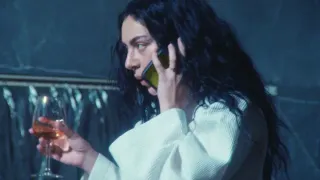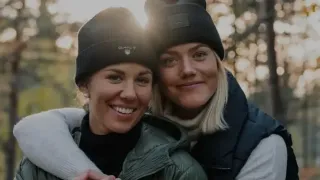February 5, 2021
Best (and the Rest) of Sundance 2021
Frank J. Avella READ TIME: 14 MIN.
This year's pandemic-related "reimagined" Sundance Film Festival has not suffered one bit in terms of quality, although the manner in which the online Fest was administered could have been better, with a too-elaborate way of securing tickets and some films slipping through the cracks because of an arbitrary "sold out" rule that confused many. How does a film sell out virtually? Should that even be a thing? It makes sense that a film can sell out when you are physically present, but for it to sell out online, during a pandemic, really? What is the point?
In any event, the films are what matter. Here is a roundup of what I saw during the Festival proper.
FYI: I mentioned in my preview/picks piece that Robin Wright's "Land" was the best film I had seen to date. It remains my favorite.
Here are some other gems as well as a couple of clunkers.
"Judas and the Black Messiah"
"Judas and the Black Messiah" is a powerful Oscar contender with a career-best performance by Daniel Kaluuya as 1960s Black Panther Party Chairman Fred Hampton (peripherally featured in Aaron Sorkin's "The Trial of the Chicago 7"). Directed with Oliver-Stone-fearlessness by Shaka King from a dense script by King and Will Berson, this searing film follows FBI informant William O'Neal (a terrific LaKeith Stanfield) as he infiltrates the Black Panthers to take them down by whatever means necessary. The film has an urgency that is empowering in a country that seems doomed to repeat history over and over again. My mouth is still agape from the climax.
"CODA"
Writer-director Sian Heder manages to take pieces of oft-told cinema tales and richly and uniquely rework them, weaving what feels like a brand-new tapestry with "CODA" (an acronym for Child Of Deaf Adults), an absolutely delightful film about the only hearing member of a deaf New England fisherman's family who would rather pursue a career in singing than fishing. The quartet of lead actors (Emilia Jones, Troy Kotsur, Marlee Matlin, and Daniel Durant) are all excellent, with Matlin especially poignant and hilarious and Durant showing leading man charisma. Jones is also a great find. "CODA," a remake of a 2014 French comedy, had me going through a legion of emotions, with many later scenes packing a powerhouse punch. I cannot recommend this film enough.
"CODA" swept the Sundance Awards, winning the Grand Jury Prize, the Audience Award and the Directing Award and the Special Jury Prize for Ensemble Cast (all in the U.S. Dramatic category).
"Mass"
Fran Kranz' gut-wrenching, riveting first film, "Mass," could easily be a stage play but never feels any less cinematic. This tense, potent work brings together the estranged parents of a school shooter with the grieving parents of one of his victims, six years after the tragedy – although the scars still feel fresh. Kranz covers quite a lot in his penetrating screenplay, and has cast his film perfectly with Martha Plimpton and Ann Dowd especially outstanding as the distraught mothers (both deserve awards recognition) and Jason Isaacs and Reed Birney also doing impressive work. Breeda Wool manages to steal a few of her early scenes. "Mass" is what indie cinema should be: Incisive, contemplative, questioning, and thought-provoking.
"Misha and the Wolves"
Sam Hobkinson's extraordinary doc, "Misha and the Wolves" tells a truly remarkable and unbelievable story with more twists and turns than an Agatha Christie novel! The film chronicles the famed and insane saga of a Belgian Holocaust survivor and how she literally lived among wolves as a child in an effort to walk to Germany. But did she? Or has she been propagating a hoax for decades and reaping the financial rewards? The truth is much more complex and gobsmacking. Is she a victim or villain? Or both? Hobkinson's investigative feature is surely to be one of the most talked-about docs of 2021.
"Passing"
Emotionally rich and incredibly nuanced performances by Tessa Thompson and Ruth Negga anchor "Passing," a moody and mesmerizing film based on the 1929 novel by Nella Larson and directed by Rebecca Hall. Shot in black and white with a standard old Hollywood aspect ratio, "Passing" is a beguiling meditation on race, friendship, jealousy, trust, and perception. Thompson's grounded Irene is a remarkable creation. Negga's gloriously showy Blanche DuBois-meets-Daisy Buchanan turn made me long for more of her every time she wasn't onscreen.
"Summer Of Soul (...Or, When The Revolution Could Not Be Televised)"
Thanks to director Ahmir "Questlove" Thompson, a vital part of black history, music history, and American history that was virtually erased over 50 years ago is now finally able to be told. The rousing, forceful, and jubilant doc "Summer Of Soul (...Or, When The Revolution Could Not Be Televised)" chronicles the Harlem Cultural Festival where, in the summer of 1969 (same time as Woodstock), over 300,000 people gathered for six consecutive Sundays to celebrate black music and culture. Footage of the event was shot, but then no one was interested in doing anything with it. Now, a half century later, it can finally be experienced. The fierce Nina Simone is the highlight among many highlights.
"Summer of Soul" won the Grand Jury Prize and the Audience Award, both in the U.S. Documentary category.
"John and the Hole"
Pascual Sisto's feature debut, "John and the Hole" (the provocative title proves perfect), is an original, terrifying work about a 13-year-old boy (Charlie Shotwell, dead-on enigmatic) who finds an abandoned bunker and decides to drug his family and toss them inside. Oh, and keep them there. The film reminded me of "Dogtooth," but boasts its own singular vision. The film is based on a short story by Oscar-winning "Birdman" scribe Nicol�s Giacobone, who also wrote the wonderfully bizarre screenplay. Michael C. Hall, Jennifer Ehle, and Taissa Farmiga provide terrific support in this deliberately abstract and ambiguous portrait of affluent adolescence gone awry.
"On the Count of Three"
What happens when two suicidal best friends get together on one of their respective worst days? They decide to simultaneously end their lives by shooting each other, but first they need to take care of some business. Jerrod Carmichael's marvelously fucked-up directorial debut, "On the Count of Three" has a "Thelma and Louise" meets "Queen & Slim" bromance feel about it and taps into that sense of despair we can all feel – especially during these pandemic days. Christopher Abbott and Carmichael deliver fierce, fully committed turns as the two psychologically-wounded protags.
"On the Count of Three" won the Waldo Salt Screenwriting Award (U.S. Dramatic).
"Flee"
Jonas Poher Rasmussen's "Flee" chronicles the sincerely personal story of a good friend through an unrestrained narrative. Amin is an Afghan refugee who has kept some scarring secrets in order to survive. He also happens to be gay. This atypical film chronicles his journey through a blend of animation and doc footage. It also boasts one of the most surprising reactions by a brother discovering his sib is gay that I've witnessed.
"Flee" won the World Cinema Grand Jury Prize (Documentary).
"Jockey"
An aging and ailing jockey's world is upended when a young man claims to be his son. That's the basic plot of Clint Bentley's contemplative, atmospheric indie, "Jockey." The film blends real people with actors (although the device worked better in "Nomadland"), and is sometimes understated to the point of tedium. What saves it is the terrific performances of Clifton Collins, Jr. and the underrated and underused (in most films), yet luminous, Molly Parker. There is a wonderful celebratory sequence between Collins and Parker that shows what the film could have and should have been, had they been the sole focus.
Clifton Collins, Jr. won the Special Jury Best Actor Award (U.S. Dramatic).
"Violation"
Provocative is an apt description of Madeleine Sims-Fewer & Dusty Mancinelli's disturbing and (sometimes) disgusting film, "Violation." It had me squirming in my seat (which makes sense). I felt angry. I challenged my own rage at the central character, played by co-director Sims-Fewer, who decides to seek revenge on her brother-in-law for raping her. It's not that I didn't understand her feelings, it's that I didn't feel the extremity of the actions were warranted. But then I thought about the plethora of films where we are forced to watch women repeatedly brutalized. Perhaps this is a check-mate to misogynist cinema.
"Violation" reminded me of Lars von Trier's work, and not just because it made me feel really uncomfortable, but because the filmmaking style was blunt and daring. But the film is also meandering, and the main character isn't given enough dimension. Jesse LaVercombe, however, must be commended for his super-brave performance.
And in the WTF? Category
"Coming Home in the Dark"
I'm sure there's an audience for James Ashcroft's brutal "Coming Home in the Dark," but this story of a murderous monster and his accomplice who terrorize a small family angered and alienated me beyond belief. I had some hope that there was a point to the carnage, but, alas, this was just another glorification of violence. Still, it certainly got a rise out of me.
"Wild Indian"
Another film that confounded me is Lyle Mitchell Corbine Jr.'s "Wild Indian." Here we have a protagonist who viciously murders a schoolmate, feels nothing about his crime, and then grows into an even more loathsome adult who never really gets his due. So why are we supposed to take this 87-minute journey? Sure, there's some kind of violence-begets-violence theme here, but is that enough? I think not.
Final Note: The only film I had to turn off (after 30 minutes) was Sion Sono's "Prisoners of the Ghostland." I found it maddeningly mind-numbing. Nicolas Cage needs a new agent.






